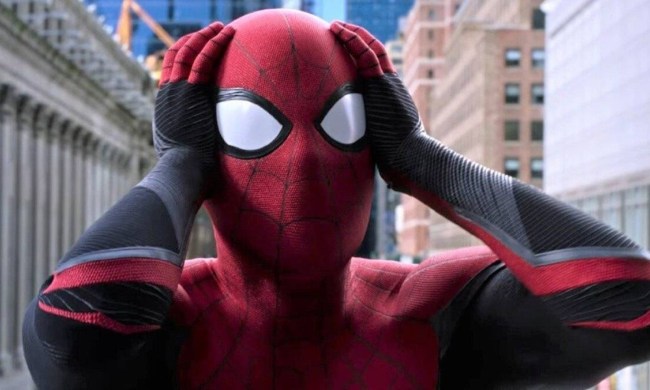Morbius, Sony’s long-gestating project starring Jared Leto, finally premiered on April 1 after almost two years of delays. The film centers on Morbius the Living Vampire, one of the many antiheroes in the Marvel mythos, who rose to prominence mainly by antagonizing everyone’s favorite friendly neighborhood Spider-Man. Morbius is the latest in Sony’s so-called Spider-verse, its effort to create a cinematic universe mighty enough to compare with Kevin Feige’s ubiquitous empire known as the MCU.
Sony’s idea is not entirely ridiculous. After all, villains are often the most interesting and compelling characters in any given story. Would Hamlet be as timeless without Claudius? Would The Silence of the Lambs be as thrilling without Hannibal and Buffalo Bill? A great villain is vital for a successful story, perhaps more than a great hero. It’s the villain that creates the conflict and drives the story, keeping audiences invested in the action. The comic book genre has the perfect example of this with The Dark Knight, by far the best live-action Batman movie and the outright best comic book movie in the eyes of many. Christian Bale’s Batman might be the protagonist, but Heath Ledger’s Joker is the star of the show, the puppeteer pulling Gotham’s strings.
Spider-Man’s corner of the Marvel universe has some of the most dynamic antagonists in the comic book world. From Green Goblin to Carnage, the web crawler’s rogues’ gallery is as iconic as Spidey himself. Some of them have even starred in unforgettable storylines that cemented their legacies; think of Kraven’s Last Hunt, The Night Gwen Stacy Died, or Shed. Indeed, Spidey’s villains are anything but boring and could make for compelling and entertaining protagonists without sacrificing their villainy. The golden age of the antihero might be close to ending, but that doesn’t mean audiences aren’t interested in seeing a baddie take center stage. So why is Sony’s villain-centric Spider-verse failing? The answer isn’t as straightforward as some might think.
A skeleton without a spine

Nowadays, studios seem to be blindly chasing the gold, and by gold, we mean the MCU. Indeed, the Marvel Cinematic Universe was a game changer for Hollywood, racking up success after success and leaving everyone else to collect itz dust. The MCU is not universally beloved — far from it, in fact. Some people outright despise it, seeing it as a shameless cash grab that’s slowly eroding the very foundations of cinema as an art form. However, a quick look at Spider-Man: No Way Home‘s success makes it clear that mainstream audiences don’t seem to care. The web crawler’s latest cinematic adventure currently stands at $1.889 billion at the worldwide box office. It’s hard to argue against that level of success.
Logically, everyone in Hollywood wants a piece of that billion-dollar pie. Sony, in particular, wants in on the action, considering it holds the rights to the entire Spider-Man catalog. The studio is shameless and cynical in its desire to cash in on Spidey’s glory, to its detriment. After all, isn’t that the reason for audiences’ indifference toward Sony’s latest Spidey-adjacent offerings? Nothing in these movies, be it Morbius or Venom: Let There Be Carnage, seems unique or inspired. Every choice seems automatized and generic, the same candy but with a slightly altered packaging.
When Venom came out in 2018, it seemed fresh enough to entice audiences. The character was one of Marvel’s most popular antiheroes, and seeing him on the big screen was too tempting to pass. Against all odds, the film was a massive commercial success, grossing $856 million worldwide. Sony quickly announced similar stand-alone movies based on some of Spider-Man’s most infamous villains, letting fans know it was building a Spidey-centric version of the MCU.
Fans were less enthusiastic about Venom: Let There Be Carnage, the 2021 follow-up that marked the debut of yet another fan-favorite Marvel villain. The film grossed $300 million less than its predecessor, but it was released during a global pandemic, making the comparison somewhat unfair. Still, fans were already showing cynicism and resistance toward Sony’s blossoming cinematic universe.
What’s a trip without a destination?

The truth is, audiences want their cinematic universes to seem purposeful. Say what you will about the MCU, but Feige took the time to build something from the ground up. He established clear intentions for each of his films, creating an intricate puzzle that came together at the end. But Sony’s villain-verse is aimless and erratic. What’s the purpose of having a Morbius movie in this new universe? How does Morbius relate to Venom or Kraven? What’s the common thread?
Sony would be wise to choose a lane and stay in it if it wants to succeed. No Way Home set a precedent for a Sinister Six team-up, and (SPOILER ALERT!) the ending of Morbius strongly suggests that’s happening in the near future. Sure, it might seem ridiculous to make a Sinister Six movie without Spider-Man, but who says Tom Holland has to swing over to the Sony-verse when at least two other perfect Spider-Men are waiting for a call? Furthermore, who says Spider-Man has to be the protagonist of this franchise? Having the superhero be the antagonist would be a fresh twist in a genre quickly becoming stale and painfully predictable.
The truth is, Sony had the right idea, but its execution is shoddy at best. Villains can be worthy protagonists, but it has to be the right villain. Sony seems to be choosing characters at random and throwing them into bland PG-13 movies, hoping they’ll succeed. What’s the plan for them after their solo movie? How do they fit into the larger universe? These are questions Sony needs to ask itself before green-lighting a solo movie. So far, its choices are divisive at best.
Morbius is a layered and potentially engaging character, but Sony ruined his chances by casting a deeply divisive actor (Leto) in the title role and surrounding him with the most basic storyline, a plot that fails to justify its existence. On the other hand, Venom already proved himself capable of headlining a solo movie, thanks to the character’s name recognition and Tom Hardy’s committed performance. It’s too soon to tell how Kraven will do, but the movie’s future doesn’t seem too bright. No offense to Aaron Taylor-Johnson, but his track record isn’t exactly promising, and the film seems to be repeating the same tired formula that sank the Venom sequel and Morbius.
Enter Madame Web

Still, not all is lost for Sony’s villain-verse because Madame Web sounds like the most refreshing idea it’s had in years. Madame Web is a supporting character in the Spider-Man comics, traditionally depicted as an older woman with clairvoyance who acts as an ally and occasional foe for the web crawler. Madame Web is not a particularly popular figure, but there might be something in her storyline to make her worth the audience’s while. The Madame Web project is also shaping up nicely, with Dakota Johnson starring in the title role. As she’s demonstrated in films like The Lost Daughter and Cha Cha Real Smooth, Johnson is an infinitely more interesting performer than Leto or Taylor-Johnson, and with Euphoria‘s Sydney Sweeney backing her up and the potential to bring not one but several Spider-Women into the fold, Madame Web may very well be Sony’s most promising project since Venom.
And this is where Sony can truly succeed. The MCU found its identity with family-friendly, highly comedic action-driven adventures that sacrificed thematic depth for visual spectacle. Flawed as it may be, DC is best known for its overly dark, auteur-driven projects that showcase the best and worst of its titular heroes. Sony needs to find an identity for its Spider-verse beyond seeming like a poor man’s attempt to replicate Spider-Man’s MCU success.
The basic idea is already there: Sowcasing compelling and complex characters that walk the fine line between light and dark. The next step is choosing the right characters; they will perhaps lack the same name recognition as Spider-Man, but it’s Sony’s job to do the work and develop them. Madame Web is an intriguing choice, and so would characters like Chameleon, Silver Sable, Mister Negative, or Jackal. But if they’re going to use every toy in their box, Sony can’t be afraid of doing the work required to build them up.
It’s good to be bad

If Sony wants to become a player in the cinematic universe, it needs to let its villains be just that: villains. Stop turning them into antiheroes and set them loose in all their evil glory. When Alessandro Nivola was cast as the main villain for the Kraven film, fans rolled their eyes. No one wants to see Kraven the Hunter as a good or misunderstood guy; on the contrary, fans want to see him being brutal and cruel because that’s who the character is. Just because Venom works as an antihero doesn’t mean every villain will. Some characters are evil, and that’s OK. But turning bad guys good by having them face another eviler foe is lazy and takes away from the original character, leaving them as something lesser.
Sony can win with its villains. Morbius will likely fail critically if not commercially, but the studio’s journey is just starting, and one mistake does not a cinematic universe destroy. Sony needs to have the guts to create something new without shortcuts or cheats. Most importantly, it can’t be afraid of risks, and it needs to stop imitating the MCU because it’ll never catch up. However, that doesn’t mean it can’t create something meaningful or successful.
Madame Web might not be a billion-dollar film, but it can be something fresh for the comic book genre, paving the way for Sony’s villains to rise and claim the spotlight. But Sony needs to believe in them and give them a chance to shine as what they are. Otherwise, what’s the point? We already have plenty of great comic book heroes in cinema; what we lack are equally great villains who, like Joker demonstrated, can headline their own films without sanitizing them. In a world of Spider-Men, it’s important to have Venoms and Kravens that are true to their brutal natures. But please, no more Morbiuses.



